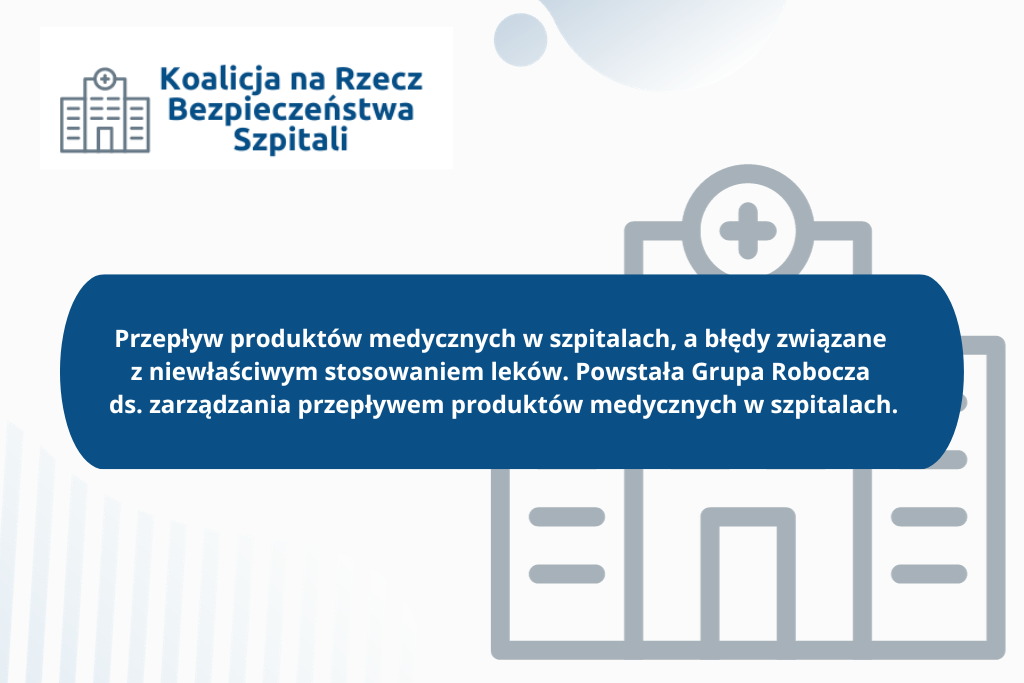Adequate management of the flow of medical products is crucial for the safety of medical staff, healthcare professionals and patients alike. Medication errors in the European Union are responsible for 163,000 deaths per year, and unsafe practices and drug-related harms account for 50% of all preventable harms in medical care worldwide. As a result, the Hospital Safety Coalition has set up a Working Group on Managing the Flow of Medical Products in Hospitals.
Managing the flow of medical products in hospitals and the safety of patients and medical staff.
Lack of proper management, logistics, systems and training in the administration of medicines can cause serious harm. The safety of medical staff and patients is at risk if medical products are improperly stored, prescribed, administered or if they are insufficiently monitored. The experts of the Safety Coalition recognised that this problem requires a response, action and the development of appropriate documents and recommendations. A Working Group on Management of Medical Product Flows in Hospitals was established and chaired by Dr. n. ekon. Anna Gawrońska, Expert of the Coalition for Hospital Safety, area leader for GS1 standards in healthcare at Łukasiewicz - Poznań Institute of Technology. The working group was also joined by Dr. n. pharm. Krystyna Chmal-Jagiełło, Ph. Piotr Merks, M.Sc. Marcin Bochniarz, M.Sc. Magdalena Ryznar-Zaręba, M.Sc. Marzena Janowska and M.Sc. Marcin Bicz.
"The Hospital Medical Product Flow Management Working Group is a response to medication errors and medical product flow issues. Experienced Experts have joined the Working Group, and I believe that together we will tackle the biggest challenges related to the flow of medical products, and we will achieve the goals we set at the first meeting of the group." - comments Dr. n. ekon. Anna Gawronska Chair of the Working Group on the Management of Medical Product Flow in Hospitals, Expert of the Hospital Safety Coalition"
The establishment of the working group is also a response to the needs of Polish hospitals, which face problems related to errors resulting from the manual entry of data into the computer system, the duplication of activities that are performed, or the prolonged response time to patient needs in the area of pharmacotherapy, as a result of the need to handle a large number of paper documents and the lack of automation of selected activities.
"The need to digitise the workflow of documents related to the distribution of medical products on the premises of medical facilities and to pay attention to the importance of interoperability standards in existing and new IT systems, is also an important element that cannot be overlooked in the flow of medical products. It is also necessary to pay attention to the importance of unambiguous identification: of patients, medical staff and medical products within hospitals." - points out mgr. pharm. Marcin Bochniarz, Expert of the Medical Product Flow Management Working Group.
What measures should be taken so that there are fewer errors in the flow of medical products?
The most important goals of the group will be to develop recommendations for the application of good practices developed by the Interoperability Council, to promote good practices in the management of medical product flows in hospitals and to popularise the implementation of interoperability standards in medical facilities for the reduction of medication errors in medical facilities and appropriate reporting. In addition, these recommendations will help hospitals to effectively and efficiently implement selected legal requirements, e.g. the so-called Falsification Directive or the MDR - Medical Device Regulation. As part of the working group's activities, studies will also be carried out, which will result, among other things, in concrete figures on medical errors related to inappropriate administration of medical products on hospital premises.
"In order to develop appropriate recommendations and to know the actual status of the occurrence of medication administration errors in medical facilities, appropriate studies should be conducted. The aim should be to create circumstances in which it is the patients who force the Ministry of Health and other government bodies to take action to improve the safety of pharmacotherapy and the use of medical devices." - adds Dr. n. pharm. Piotr Merks, Expert of the Medical Product Flow Management Working Group.
Ensuring the proper flow of medical products requires a lot of coordinated action, research and reporting. The Hospital Safety Coalition and its working groups will work proactively to ensure the safety of both medical staff and patients.
—————————
The Hospital Safety Coalition was established in 2021 with the main aim of increasing the safety of healthcare workers in the workplace by, among other things, promoting and encouraging hospitals to use safe medical equipment. The Coalition's main project is the 'Safe Hospital is Safe Patient' programme, which is joined by medical facilities that adhere to its recommendations. Patronage of the project is held by: The National Health Fund, the Patient Ombudsman, the Supreme Chamber of Nurses and Midwives, the Polish Federation of Hospitals, the Supreme Medical Chamber, the Polish Association of Epidemiological Nurses, the Polish Society of Anaesthesia and Intensive Care Nurses, the Polish Society of Epidemiologists and Doctors of Infectious Diseases, the Polish Vascular Access Club, the Association of Hygiene in Healthcare, Polish Association of Private Hospitals, the Polish Pharmaceutical Society, the Supreme Pharmaceutical Chamber, the European Association of Clean Treatment, the Association of Healthy Polish Cities, the National Chamber of Laboratory Diagnosticians, the Polish Society of Microbiologists, the Polish Nursing Association, the National Trade Union of Physicians, the Institute for Patient Rights and Health Education and the Polish Society of Infusion Nursing.

